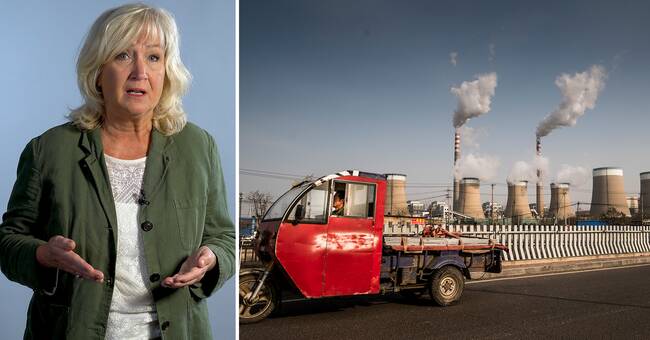Xi Jingping likes to surprise.
When the UN General Assembly opened last year, his message came that China is setting an end date for its emissions - the country will have net zero emissions by 2060.
Last night it was time again.
Many had hoped for a message that China was closing down its own coal-fired power plants.
Instead, the message was that China will stop investing in coal-fired power plants abroad but will continue its expansion of coal-fired power at home.
As China is responsible for a majority of all new coal power investments in developing countries, the announcement is a step forward for the climate.
Earlier, both Japan and South Korea announced that they would stop funding coal-fired power projects abroad.
The three countries have accounted for 95 percent of all aid-financed coal power in developing countries.
The world's largest emitting country
But according to the Financial Times, the Beijing-based think tank International Institute of Green Finance states that between 2014-2020, China already decided to scrap half of its planned coal-fired power plants abroad "due to increased economic competition from wind and solar power".
China's turnaround would thus be more motivated by what is economically profitable than caring for the climate.
China is the world's largest carbon dioxide emitter.
The country accounts for 27 percent of global emissions.
A review conducted by Global Energy Monitor shows that during the first half of 2021, China announced plans for 24 new coal-fired power plants, together with new steel-fired power plants at home, China's emissions will increase by 150 million tonnes of carbon dioxide per year.
China's climate strategy seems to be running at full blast with coal power - until the deadline of 2060, while a majority of the world's countries are instead considering how to halve their emissions by 2030. To achieve their goal of achieving net zero emissions to By 2060, China will have to shut down 600 coal-fired power plants over the next ten years, according to estimates from TransitionZero.
Javascript is disabled
Javascript must be turned on to play video
Read more about browser support
The browser is not supported
SVT does not support playback in your browser.
We therefore recommend that you switch to another browser.
Read more about browser support
Here Xi Jinping gives his new message about the coal power plants.
Photo: AP
"Ideal for big tensions"
Tensions are high between China and other countries around the negotiating table at the global climate negotiations, which begin in Glasgow in early November.
Xi Jingping has not yet announced whether he intends to attend Glasgow.
China is under great pressure where both the EU and the US are planning carbon dioxide tariffs that will affect Chinese exports.
Att kolet måste förpassas till historiens skräpkammare är det första av fyra uttalade mål för förhandlingarna. Premiärminister Boris Johnson har skapat devisen ”Coal, Cash, Cars and Trees” för att sammanfatta det brittiska ordförandeskapet ambition med de globala klimatförhandlingarna i november; att all kolkraft fasas ut, att rika länder ökar sina anslag till de fattigare länderna för att kunna ställa om till grön ekonomi och hantera kostnaderna för det tilltagande extremvädret, att förbränningsmotorn ska förbjudas globalt till 2040 och att avskogningarna ska upphöra.
That China chose to come up with a promise of less coal power was a welcome message for Boiris Johnson, but the big challenge remains.
China alone emits 27 percent of global carbon dioxide emissions and the majority comes from coal power.
India also continues to invest in coal power.
Australia has opened the world's largest coal mine.
None of these three countries have so far made any stricter climate promises to Glasgow.
There are five weeks left.

